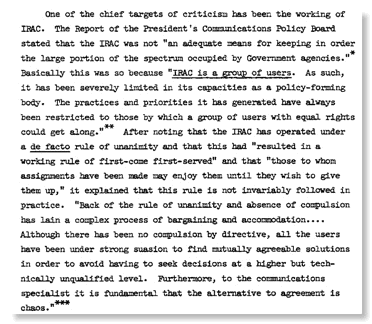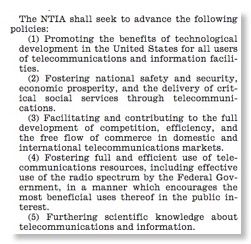Federal Spectrum Reform in the Next Administration
In practice, IRAC has had a major role in federal spectrum policy development and the top leadership of NTIA rarely overrules its decisions. Indeed, having sat in on may IRAC meetings it is clear that in the view of many IRAC members, NTIA is the law firm that represents their views to FCC and Congress and its not a regulatory agency. These members also tend to view the NTIA Office of Spectrum Management as the "IRAC Secretariat" -implementing the will of IRAC and recording the spectrum assignments that it has approved. Indeed a review of the spectrum report coauthored by Nobel laureate Ronald Coase in the early 1960s, "Problems of Radio Frequency Allocation" shows not much has changed int eh decades since it was written. In particular, the section entitled "The Work of the Interdepartment Radio Advisory Committee" may be the most accurate description of how IRAC worked publicly available although there have been some minor changes over the decades. Here is a section from the Coase report:
.
Would the pending MOBILE NOW Act and previously congressionally mandated reallocations of federal spectrum to nonfederal use have been necessary of NTIA and FCC had been working together in the national interest? Do the delays and uncertainties of needing Congress to act on these impose real costs on economic growth? While the cellular industry has the political influence to get legislative support for such reallocations, other spectrum users may not - particularly those in the early stages of their business plans - do not have enough political influence but may have significant economic potential.
The irony is that the congressionally mandated reallocations of the past 2 decades have resulted in antagonisms against reallocation of federal spectrum to non federal government users so requests for access to federal spectrum from less politically connected parties tend to get at best a slow response from NTIA.
I even had a client who was a military contractor who requested brief access to passive spectrum near 100 GHz that had no interference risk to any actual passive systems and the initial application was rejected by NTIA because one IRAC member did like the idea of it. It took a month of a DoD IRAC member beating up on the objecting IRAC member before be finally relented and dropped his objection. It did not appear that during this pendency any NTIA employees ever asked the objecting agency for a "reality check" to see if there was any technical merit to their objection. If this is how they handle requests of military contractors, imagine how privately funded research from non-CTIA members is handled?




![Validate my RSS feed [Valid RSS]](valid-rss-rogers.png)

